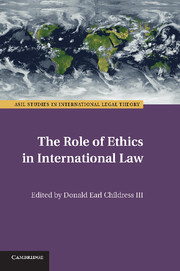Book contents
- Frontmatter
- Contents
- Contributors
- Acknowledgments
- Introduction
- Part one The Role of Ethics in Public International Law
- 1 Moral Reasoning in International Law
- 2 Between Power and Principle
- 3 Jus Cogens: International Law's Higher Ethical Norms
- Part two The Role of Ethics in Private International Law
- Part three Normative and Theoretical Perspectives
- Index
- References
3 - Jus Cogens: International Law's Higher Ethical Norms
Published online by Cambridge University Press: 05 December 2011
- Frontmatter
- Contents
- Contributors
- Acknowledgments
- Introduction
- Part one The Role of Ethics in Public International Law
- 1 Moral Reasoning in International Law
- 2 Between Power and Principle
- 3 Jus Cogens: International Law's Higher Ethical Norms
- Part two The Role of Ethics in Private International Law
- Part three Normative and Theoretical Perspectives
- Index
- References
Summary
Introduction
Most international lawyers recognize that the international legal system includes a category of higher ethical norms known as jus cogens or peremptory norms. Most international lawyers also agree as to the operation or effect of jus cogens norms within the system. Such norms void conflicting lesser norms. To explain the existence of the category and how the norms operate, most international lawyers turn to natural law theory. A few international lawyers do argue that there is no such category as jus cogens. A larger group accepts that the category exists but rejects any role for natural law theory. Those rejecting natural law seek to explain jus cogens norms on the basis of positivism. Nevertheless, even with these doubters, the doctrine of jus cogens provides a good example of consensus in the international legal community.
The consensus begins to break down, however, over how to identify jus cogens norms. In turn, the uncertainty regarding identification leads to debates over just which norms qualify as jus cogens. This chapter offers a preliminary investigation into the appropriate process in the system of international law for identifying jus cogens norms. To understand that process, the chapter considers a variety of evidence respecting jus cogens, including the negotiating history of the Vienna Convention on the Law of Treaties, important judicial decisions that discuss particular norms belonging to the category, and the writings of scholars. This evidence confirms that government officials, judges, and scholars have identified a number of important norms as jus cogens norms. These norms are generally of an ethical or moral nature. At the same time, little, if anything, is said about how these scholars and judges know that a norm is a peremptory norm. The chapter, therefore, examines both the nature of jus cogens norms and principles of legal process theory to propose a methodology for identifying jus cogens norms in future cases.
- Type
- Chapter
- Information
- The Role of Ethics in International Law , pp. 78 - 98Publisher: Cambridge University PressPrint publication year: 2011
References
- 5
- Cited by



